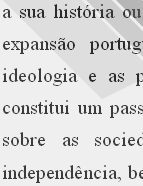

................................
While studies on the Others advanced during the final period of the dictatorship, they continued to highligh the interferences of colonialism. The African 'experts' were unable or unwilling to modify the ingrained reductive perspective, in particular of the African populations, and comfortably shared by the Portuguese settled in the colonies and by a metropolitan population nurtured by the colonial ideology, thus manifesting a solid national unity, which reduced the importance of conflicts between the 'supporters of the regime’ and the 'opposition', and opened no significant gap for the scientific knowledge of the Other.
Portuguese historiography and the history of colonised peoples
Limitations of the historiography of the Portuguese discoveries and expansion
Portuguese historiography prior to 1974 was characterised by the constant refusal to consider the historical autonomy of the colonised, who remained a peripheral object of a national history tied to colonial mythology and to the praise of the mission to “civilise" the Others. Centred around the study of the discoveries and overseas expansion, most Portuguese historians, despite their apologia of the value of impartiality in the writing of history, remained tuned to the demands of political indoctrination in the 19th century and in the First Republic, reinforced by the harshness of colonialism and the censorship of the Estado Novo. The relationship between historiography and ideology at the service of the colonial project was characterised by harmony between the supporters and opponents of the regime in the task of historically and culturally devaluing the dominated peoples.
It was thus against the historiographical backdrop of the Portuguese discoveries and expansion, timidly extended to the colonial empire, censored and prohibited by the political-ideological directives, that the emergence of the Other came to be, and it is essential to underline the differentiation and hierarchisation of the Portuguese readings - in the wake of their European counterparts - between the African and the Asian, to mention only those who constituted the colonised of the Portuguese empire in the nineteenth and twentieth centuries.
